What is Japanese grammar? When we try to tell something, we use “words” and the words should be put together to create a proper sentence. In order to make your sentences correctly, you must follow its “set of rules.“
Japanese grammar and sentence structure are totally different from what you used in English. So for you to understand the basics, we introduce the various parts of speech, including the demonstrative. Also, we will teach you how to form a sentence and its types in a very easy way.
Keep on reading to learn more about the Japanese language!
Japanese Grammar: Parts of Speech
A part of speech
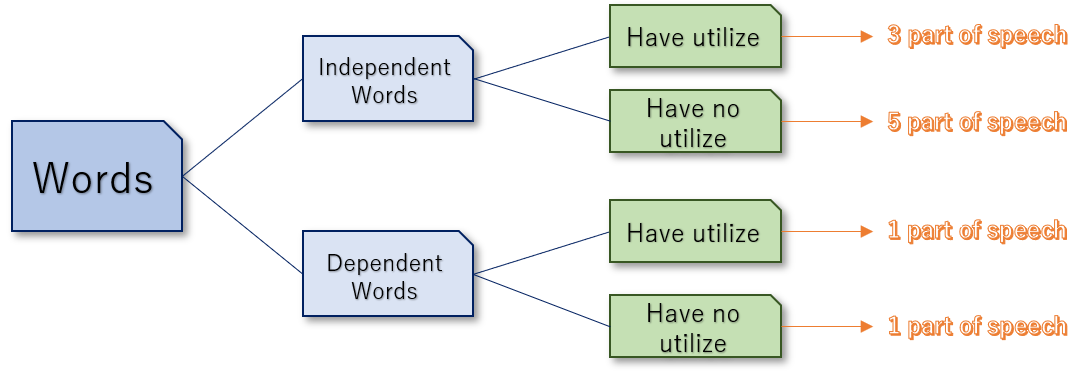
Independent words that have to utilize: Verb, Adjective, Adjective verb
-
- Verb – a group whose basic form of a word’s the end with a sound of 「う(u)」 syllable such as「書く(ka ku=write)」and「読む(yo mu=read)」.
- Adjective – a group whose basic form of a word’s the end with a sound of 「い(i)」 syllable such as 「楽しい(ta no shi i=enjoynable)」and「多い(o o i=many)」.
- Adjective verb – is group whose basic form of a word’s the end with a sound of 「だ(da)」 syllable such as 「穏やかだ(o da ya ka da=calm)」and「元気だ(ge n ki da=fine)」.
These three parts of speech can become Predicate alone. 「用言(yo u ge n=inflection)」.
Independent words that don’t have to utilize: Noun, Adverb, Ad-nominal, Conjunction, Interjection
-
- Noun – a group which mainly becomes subject such as 「私(wa ta shi=I)」and「富士山 (Fu ji sa n=Mt. Fuji)」.
- A noun can become a subject alone. 「体言(ta i ge n=substantive)」.
- Adverb – group which mainly becomes attributive modifier that qualifies inflections such as 「とても(to te mo=really)」and「すぐに(su gu ni=soon)」.
- Ad-nominal – a group which mainly becomes attributive modifier that qualifies substantives such as 「あの(a no=that)」and「たいした(ta i shi ta=great)」.
- Conjuntion – a group which connects the words such as 「だから(da ka ra=so)」and「しかし(shi ka shi=but)」.
- Interjection – a group which becomes independent words such as 「はい(ha i=Yes)」and「こんにちは(ko n ni chi wa=Hello)」.
- Noun – a group which mainly becomes subject such as 「私(wa ta shi=I)」and「富士山 (Fu ji sa n=Mt. Fuji)」.
A dependent word that has to utilize: Auxiliary verb
A dependent word that doesn’t have to utilize: Post-position
Japanese Demonstrative Speeches
It is a word pointing things, nature, condition, etc. is called demonstrative speech or「”こそあど”言葉(“ko so a do” ko to ba)」.

“This” 「これ(ko re)」 (近称=Ki n sho u) is close to you.
“That” 「あれ(a re)」(中称=Chu- sho u) is far from you and the other person.
“That” 「それ(so re)」(遠称=E n sho u) is close to the other person.
“Which” 「どれ(do re)」(不定称=Fu te i sho u) is not determined how far from you.
Units Of Words And How To Create Sentences in Japanese
Units of words
Phrases that are one of the units of words and it refers to the shortest part of a range that makes sense are important when you think Japanese grammar. When you first learned grammar, it is said that “A place that isn’t unnatural if you put 「ネ」(ne) is a delimit of a phrase.”.
e.g.)「今日はとてもいい天気です。」(Kyo u ha to te mo i i te n ki de su) =It is very good weather today.
→「今日はネ/とてもネ/いい天気です。」
「赤いチューリップの花が咲いた。」(a ka i tyu-rippu no ha na ga sa i ta) =Red tulip flowers bloomed.
→「赤いネ/チューリップのネ/花がネ/咲いた。」
Units of words are arranged in descending order of units: sentences > sentence(“.” to “.”) > phrase > word.
How to create sentences
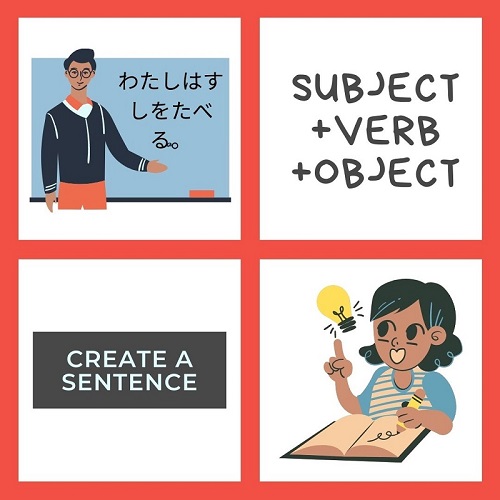
In English, the basic word order when forming a sentence is subject-verb-object (SVO), but the order in Japanese is subject-object-verb (SOV).
If you are a beginner and you interchange the object and subject order, it is okay, as long as you place the verb at the end of the sentence.
Usually, a sentence in Japanese has the following words:
- Subject: 雨が降る。(a me ga hu ru) It is rain.
- Predicate (Verb): 虫が鳴く。(mu shi ga na ku) Insects crow.
- Modifier: 彼は、速く走れる。(ka re wa ha ya ku ha shi re ru) He can run fast.
- Conjunction: おなかが空いたので、お菓子を食べた。(o na ka ga su i ta no de o ka shi wo ta be ta) I ate snacks because I’m hungry.
- Independent word: さあ、行こう!(sa- i ko u) Alright, let’s go!
4 Types of Sentences in Japanese Grammar
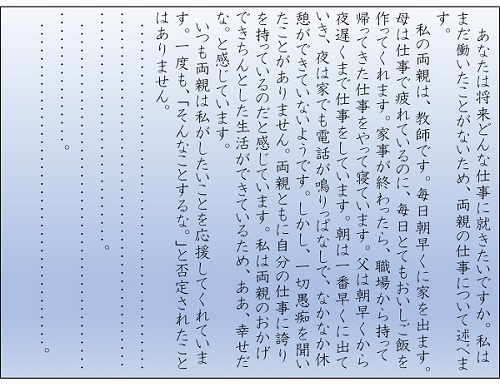
1. Declarative sentence 平叙文(he i jo bu n)
It is a sentence that describes the meaning of assertion and guess. It is common that a declaration phrase is the final form of inflection or auxiliary verb.
-
- e.g.) 私は会社員です。(wa ta shi wa ka i sha i n de su)=I’m an office worker.
2. Interrogative sentence 疑問文(gi mo n bu n)
It is a sentence that states the meaning of interrogation and rhetorical questions. It is common that a declaration phrase end with the “ka(?)” of a particle.
-
- e.g.)今日のお昼ご飯は何を食べましたか。(kyo u no o hi ru go ha n wa na ni wo ta be ma shi ta ka)=What did you eat for lunch today?
3. Exclamatory sentence 感嘆文(ka n ta n bu n)
It is a sentence that meaning of impression. It is often accompanied by interjection and the proportional particle that express the meaning of impression.
-
- e.g.)ああ、素敵な景色だ。(a a ki re i na ke shi ki da)=Wow, what a beautiful landscape!
4. Imperative sentence 命令文(me i re i bu n)
It is a sentence that describes the meaning of instruction, prohibition, and desire. A declaration phrase finish the form of instruction and 「な(na)」that express prohibition.
-
- e.g.)ここでたばこは吸うな。(ko ko de ta ba ko wo su u na)=Do not smoke here.
3 Types of Sentence Structures in Japanese
1. Simple sentence 単文(ta n bu n)
It is a sentence that consists only of a relationship between subject and predicate.
-
- e.g.)私は会社員です。(wa ta shi wa ka i sha i n de su)=I’m a office worker.
2. Complex sentence 複文(hu ku bu n)
It is a sentence that has multiple relationships between subject and predicate and is not in a parallel relationship.
-
- e.g.)私は会社員を辞め、教師になった。(wa ta shi wa ka i sha i n wo ya me kyo u shi ni na tta)=I quit a office worker and became a teacher.
3. Compound sentence 重文(ju u bu n)
It is a sentence that has multiple relationships between subject and predicate and is a parallel relationship.
-
- e.g.)私は教師になり、彼は医師になった。(wa ta shi wa kyo u shi ni na ri ka re wa i sha ni na tta)=I became a teacher and he became a doctor.
Learn how to count in Japanese Numbers from 1 to 100 by reading our Japanese Numbers: Easy Way To Count 1-100! article.
Please feel free to contact FAIR Study in Japan using the contact form below.
Error: Contact form not found.
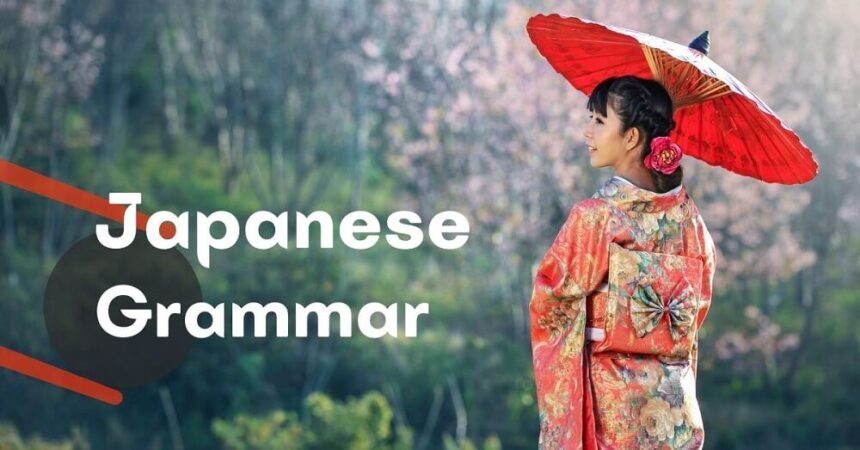



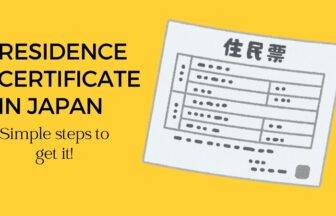

No comments yet.